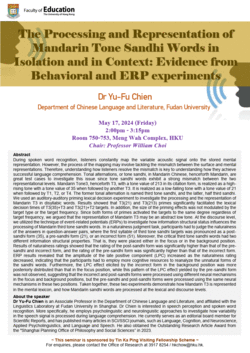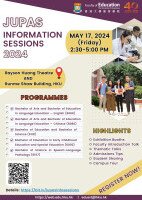The Processing and Representation of Mandarin Tone Sandhi Words in Isolation and in Context: Evidence from Behavioral and ERP experiments
Seminar
Date
May 17, 2024 (Fri)
Location
Time
2:00 PM - 3:15 PM
Speaker

The Processing and Representation of Mandarin Tone Sandhi Words in Isolation and in Context: Evidence from Behavioral and ERP experiments
Dr Yu-Fu Chien
Department of Chinese Language and Literature
Fudan University
May 17, 2024 (Friday)
2:00pm - 3:15pm
Room 750-753, Meng Wah Complex, HKU
Chair: Professor William Choi
Abstract
During spoken word recognition, listeners constantly map the variable acoustic signal onto the stored mental representation. However, the process of the mapping may involve tackling the mismatch between the surface and mental representations. Therefore, understanding how listeners resolve the mismatch is key to understanding how they achieve successful language comprehension. Tonal alternations, or tone sandhi, in Mandarin Chinese, henceforth Mandarin, are great test cases to investigate this issue since tone sandhi words exhibit a strong mismatch between the two representational levels. Mandarin Tone3, henceforth T3, with a tone value of 213 in its citation form, is realized as a high-rising tone with a tone value of 35 when followed by another T3. It is realized as a low-falling tone with a tone value of 21 when followed by T1, T2, or T4. The former tonal alternation is named third tone sandhi, and the latter, half third sandhi. We used an auditory-auditory priming lexical decision experiment to investigate the processing and the representation of Mandarin T3 in disyllabic words. Results showed that T3(21) and T3(213) primes significantly facilitated the lexical decision times of T3(35)+T3 and T3(21)+T2 targets. In addition, the size of the priming effects was not modulated by the target type or the target frequency. Since both forms of primes activated the targets to the same degree regardless of target frequency, we argued that the representation of Mandarin T3 may be an abstract low tone. At the discourse level, we utilized the technique of event-related potentials (ERPs) to investigate how information structural status influences the processing of Mandarin third tone sandhi words. In a naturalness judgment task, participants had to judge the naturalness of the answers in question-answer pairs, where the first syllable of third tone sandhi targets was pronounced as a post-sandhi form (35), a pre-sandhi form (21), or an incorrect form (51). Moreover, the critical third tone sandhi words had two different information structural properties. That is, they were placed either in the focus or in the background position. Results of naturalness ratings showed that the rating of the post-sandhi form was significantly higher than that of the pre-sandhi and incorrect form, and the rating of the pre-sandhi form was significantly higher than that of the incorrect form. ERP results revealed that the amplitude of the late positive component (LPC) increased as the naturalness rating decreased, indicating that the participants had to employ more cognitive resources to reanalyze the unnatural forms of the sandhi words. Furthermore, the LPC effect elicited by the incorrect form in the background position was more posteriorly distributed than that in the focus position, while this pattern of the LPC effect yielded by the pre-sandhi form was not observed, suggesting that the incorrect and post-sandhi forms were processed using different neural mechanisms in the focus and background positions, but the pre-sandhi and post-sandhi forms were processed using the same neural mechanisms in these two positions. Taken together, these two experiments demonstrate how Mandarin T3 is represented in the mental lexicon, and how Mandarin sandhi words are processed at the lexical and discourse levels.
About the speaker
Dr Yu-Fu Chien is an Associate Professor in the Department of Chinese Language and Literature, and affiliated with the Linguistics Laboratory at Fudan University in Shanghai. Dr Chien is interested in speech perception and spoken word recognition. More specifically, he employs psycholinguistic and neurolinguistic approaches to investigate how variability in the speech signal is processed during language comprehension. He currently serves as an editorial board member for Scientific Reports, and has published many articles in SCI/SSCI journals, such as Language, Cognition, and Neuroscience, Applied Psycholinguistics, and Language and Speech. He also obtained the Outstanding Research Article Award from the "Shanghai Planning Office of Philosophy and Social Sciences” in 2023.
~ This seminar is sponsored by Tin Ka Ping Visiting Fellowship Scheme ~
For enquiries, please contact the Office of Research at 3917 8254 / hkchow@hku.hk.




